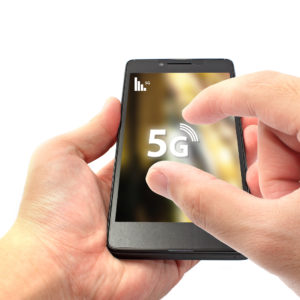Industry leaders and federal regulators are convinced 5G will radically transform the internet and the economy, but is the hype getting ahead of the tech?
Last week the 5G hype ramped up with Samsung debuting its 5G technology and POLITICO hosting a 5G event with industry leaders and federal regulators in Washington, D.C.—hype inspired by the extremely high speed 5G makes possible.
But how fast is 5G? According to Qualcomm’s tests of the technology, download speeds are at about 100 megabits per second (Mbps) compared to just 8 Mbps with LTE. Data downloads will be 100 times faster than 4G.
One of the areas where 5G speeds are creating the most excitement — and arguably has the most potential — is autonomous vehicles (AVs).
At the POLITICO event, for example, the U.S. Chamber of Commerce’s Assistant Policy Counsel of Chamber Technology Engagement Center (C_TEC) Jordan Crenshaw said that 5G is a “top consideration” for AV developers because 4G networks don’t have fast enough download/upload speeds to support the connections AVs need. AVs require a strong wireless connection in order to adopt data processing speeds that can imitate a human driver, Forbes reported.
According to Qualcomm, 5G’s “high throughput and ultra-reliable low latency communication (URLLC)” theoretically allows cars to communicate with each other “without dependency or reliance on wide area network coverage.” AVs must be able to communicate with each otherin order for them to safely use the road.
“[5G] will enable autonomous vehicles to directly share their perception of the road, road conditions and surroundings, with each other and with road infrastructure in an efficient manner,” Qualcomm said in a blog post. “Autonomous vehicles rely on several different kinds of sensors to be able to detect and infer their surroundings and road conditions. While sensors such as radar, and camera systems are essential, these sensors are limited by their line-of-sight (LOS) operation. [5G] direct communication complements the capabilities of these sensors by providing 360-degree non-LOS (NLOS) awareness, extending a vehicle’s ability to detect farther down the road — even at blind intersections or in poor weather conditions.”
AVs are just one use case of how 5G could transform various industries, of course. It could also enable and encourage the telehealth movement, which seeks to provide remote care and assistance via video call to consumers. Smartphones will have better video streaming, lower latency rates and extended battery life. In fact, 5G speeds are expected to be so fast that they will surpass cable and satellite internet, effectively allowing mobile telecomm companies like AT&T, T-Mobile and Verizon to compete with the likes of Charter Communications, Comcast and other local internet service providers (ISPs).
And then there’s the economic impact of this new level of technology: The Federal Communications Commission (FCC) believes that its plan to rollout 5G nationwide will save more than $2 billion “in unnecessary fees” and stimulate $2.5 billion in investment. And economists who’ve reviewed these estimates agree—If 5G lives up to the hype.
Not everyone is so sure that it can. Projected speeds of new wireless rollouts are rarely match reality. The peak rate of wireless users are usually only 15 percent of the projected peak rate, according to industry experts, and Wi-Fi routers in homes often only offer one third to half of the advertised speed.
If actual 5G speeds don’t reach the expected speeds, then 5G won’t enable AVs.
And then there’s the infrastructure problem. Self-driving cars can’t “self-drive” beyond the range of the network, as Motherboard reported in a recent article.
“The current geographical disparities in internet access mean it’s probably not going to happen for at least another 15–20 years,” they conclude.
According to a report from ZDNet, the key with 5G is reliability. It doesn’t matter how much faster the 5G speeds are, if they aren’t consistent and reliable, AVs and other 5G-empowered industry advancements won’t get far.
Then there’s the issue of actually processing the data 5G-connected sensors on cars will provide. It’s one thing to have a super-connected car, and quite another to know how to have the processing bandwidth to handle what it is providing.
Some industry analysts are skeptical 5G will be anything more than a “mobile upgrade:” Barclays analysts doubt, for example, that 5G will replace broadband internet in homes and businesses without a dramatic increase in investment.
It’s temping for industry innovators to oversell the promises of a new technology like 5G. Based on the current data, the right word to describe its impact is likely “evolution” rather than “revolution.” But if comes close to living up to the hype, it will make a major impact on our economy, our workplaces and our daily lives.

